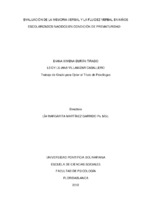Evaluación de la memoria verbal y la fluidez verbal en niños escolarizados nacidos en condición de prematuridad
Fecha
2014-09-10Director/Asesor
Martínez Garrido, Lía Margarita
Tipo de contenido
bacherlorThesis
Citación
Metadatos
Mostrar el registro completo del ítemDocumentos PDF
Resumen
Se ha informado que la condición de prematuridad tiene una fuerte relación con el rendimiento cognitivo, tanto en niños como en adolescentes. Objetivo: Evaluar el desempeño en tareas de memoria verbal y fluidez verbal en niños escolarizados nacidos en condición de prematuridad. Participantes y métodos: Se seleccionó una muestra de 40 niños, entre los 6 y 11 años de edad, de ambos géneros, pertenecientes al Colegio Técnico Vicente Azuero de Floridablanca, de los cuales el 50% presentaba la condición de prematuridad y el otro 50% fueron nacidos a término. Se aplicó un conjunto de pruebas neuropsicológicas para evaluar inteligencia, memoria verbal y fluidez verbal. Resultados: Los niños de la muestra con antecedentes de prematuridad no mostraron diferencias estadísticamente significativas al compararlos con los niños nacidos a término, en lo que refiere al desarrollo de tareas en el Raven. Por otro lado, se encontró una diferencia estadísticamente significativa entre los grupos evaluados, al compararlos en el uso de estrategias de seriado de la lista B de interferencia del Taveci. En cuanto a la variable género, las niñas nacidas a término presentaron una mayor estabilidad de aprendizaje en el Taveci, en comparación con las niñas nacidas bajo condición de prematuridad. Adicionalmente, al correlacionar la variable edad actual con el desempeño de los grupos en las diferentes pruebas, se encontraron seis correlaciones positivas estadísticamente significativas, de las cuales una arrojó correlación fuerte con el Fas semántico. En la variable edad gestacional, se hallaron dos diferencias significativas positivas con el desempeño en el Fas semántico y el recuerdo inmediato de la lista A del Taveci.Conclusión: Los niños en condición de prematuridad de la muestra evaluada poseen un desempeño en tareas de memoria verbal y fluidez verbal similar a los niños nacidos a término. It has been informed that a premature condition has a strong relationship with cognitive performance on children and teenagers. Objective: To assess performance on verbal memory and fluency assignments on children born with premature condition. Population and Methods: A sample of 40 children was selected between ages 6 to 11, from both genders male and female . All of them belonging to Vicente Azuero school . Data showed 50% was born premature and the other 50% was born on time. Neuropsychological tests were applied to test intelligence and verbal memory and fluency. Results: Children from the sample born premature did not show statistically significant differences compared to pupils born on time regarding the development of Raven assignments. On the other hand, a statistically significant difference was found between the tested groups compared to the use of strategies from the numbered list B -Taveci interference. In comparison to the gender variable, girls born on time demonstrated a higher learning stability on Taveci in comparison to the girls born premature. Furthermore, in correlating the current age with the performance of the groups in the different tests, Six differently positive correlation were found statistically significant, one of them gave an important correlation with the semantic FAS. In the gestational age variable two meaningful differences were detected concerning the accomplishment in the semantic FAS and the immediate memory of the A list from Taveci. Conclusions: Children born premature have a similar performance in the matter of verbal memory and fluency compared to children born on time.
Palabra/s clave
Psicología
Memoria
Psicología de aprendizaje
Memoria en los niños
Niños prematuros
Ecolares
Colecciones
- Trabajos de grado [6698]


